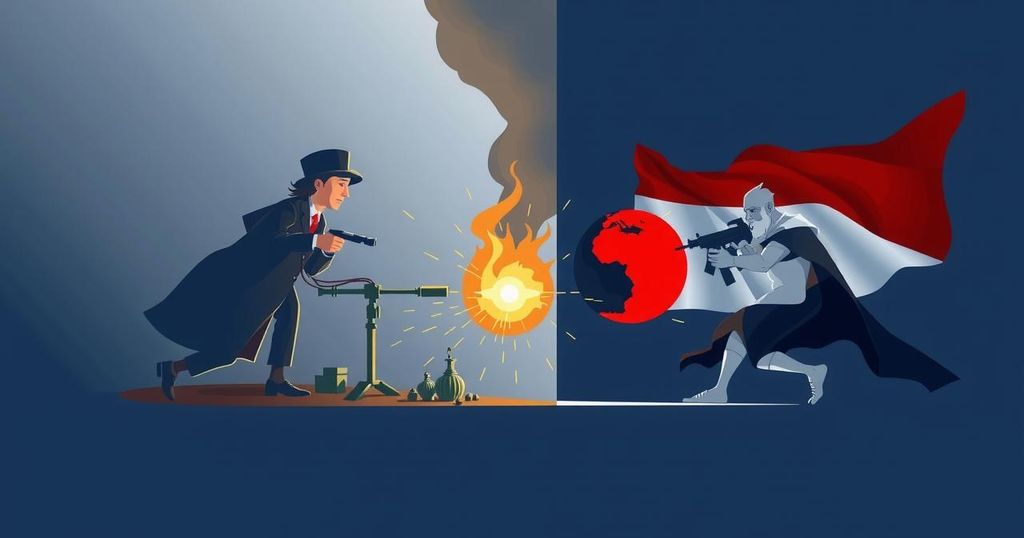U.S. Diplomatic Efforts for Ceasefires in Gaza and Lebanon

U.S. officials have arrived in Israel and Egypt to promote ceasefires in Gaza and Lebanon, following a year of diplomatic efforts. CIA Director William Burns discussed a ceasefire and prisoner exchange with Egypt’s President, while U.S. envoys focus on easing tensions with Hezbollah. The humanitarian costs of the conflicts are severe, prompting urgent calls for negotiations and resolutions based on international frameworks.
Senior U.S. officials, including CIA Director William Burns, have visited Israel and Egypt in a concerted effort to facilitate ceasefires in Gaza and Lebanon. Burns held discussions with Egyptian President Abdel Fattah El Sisi regarding the terms for a ceasefire in Gaza and possibilities for a prisoner exchange between Israel and Hamas. U.S. envoys Brett McGurk and Amos Hochstein arrived in Israel to engage in discussions about a potential Gaza ceasefire and a separate agreement with Hezbollah in Lebanon. The Biden administration’s recent diplomatic maneuvers signify a year-long push, alongside efforts from Egypt and Qatar, aimed at ending ongoing hostilities. Amidst these developments, U.S. Secretary of State Antony Blinken has made multiple trips to the region, with the current efforts perhaps being among the last significant push from Washington prior to the upcoming U.S. elections. The levels of violence caused by the ongoing conflict are staggering, with over 43,100 fatalities reported in Gaza and around 2,800 in Lebanon in the last year. A prospective ceasefire proposal, reportedly drafted by the U.S., suggests an initial 60-day cessation of hostilities which would entail the Lebanese military replacing Hezbollah’s presence along the southern border of Lebanon. According to this framework, a Monitoring and Enforcement Mechanism would be developed involving the U.S., UN, and other international actors to oversee the ceasefire’s implementation and compliance. However, substantial challenges remain regarding both Israel and Lebanon’s acceptance of the terms, with the ongoing need for a secure and enforceable agreement being paramount. Moreover, discussions surrounding a ceasefire in Gaza have yet to result in substantive progress, contributing to a dire humanitarian situation. Prominent voices assert that both Hamas and Israeli forces need to engage in pragmatic negotiations to foster a stable resolution to the ongoing conflicts.
The ongoing conflicts in Gaza and Lebanon have escalated significantly since Hamas’s attacks on Israel on October 7, 2023, which resulted in substantial casualties and hostages taken to Gaza. In response, Israel’s military operations in the region have provoked further violence, particularly from Hezbollah, which has been engaged in attacks from Lebanon. The complexity of the situation is compounded by various international diplomatic efforts aimed at establishing ceasefires and lasting resolutions, including the participation of U.S., Egyptian, and Qatari officials. The Biden administration’s latest diplomatic outreach is seen as critical not only for achieving immediate ceasefire agreements but also for paving the way toward more sustainable peace in the region through adherence to resolutions such as UN Resolution 1701 from 2006.
In summary, the current diplomatic endeavors led by the United States, in collaboration with Egypt and Qatar, represent a significant push towards establishing ceasefires in the ongoing conflicts in Gaza and Lebanon. The proposed ceasefire framework for Lebanon brings forth hopeful provisions for a cessation of hostilities, albeit with complicated acceptance from both parties. Meanwhile, efforts to resolve the situation in Gaza continue to face significant hurdles. The capacity for effective negotiations remains crucial as the humanitarian crises deepen, necessitating immediate and practical solutions from all stakeholders involved.
Original Source: www.thenationalnews.com








